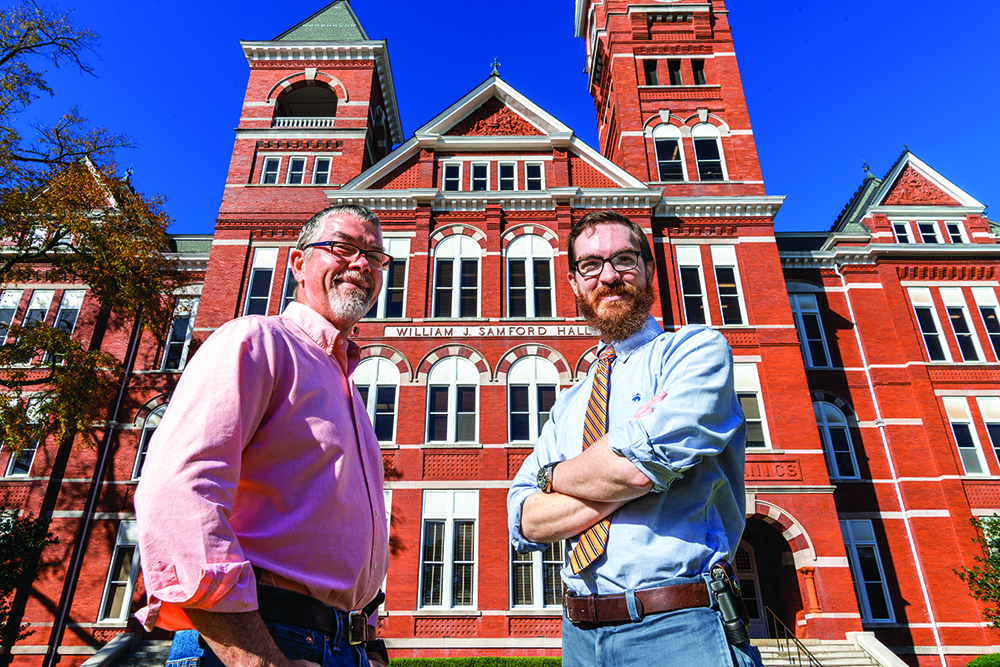
This is an Auburn story. It begins in 1974 at the University of Alabama.
There he was, 17-year-old Tom Burch from tiny Moulton, Alabama, walking around an engineering building — it was a recruitment day type thing — pondering the course of his life. As far as he knew, Tom had never met an engineer. But folks began telling him he might make a good one some day, that his natural abilities — he could fix any machine on the neighbor’s cattle farm he worked — seemed aligned with that sort of thing.
Of course, that meant going to college, which wasn’t exactly a tradition for graduating seniors at Lawrence County High School at the time.
“That just wasn’t really expected,” Tom said.
In 10th grade, he signed up for the HVAC course his dad taught. High school in the morning, technical school in the afternoon. Graduate, get a job. To Tom, it seemed like a plan. To his dad, it didn’t. If Tom wanted to learn air conditioning and refrigerator repair, his dad told him he’d be happy to teach him. But only after he’d taken all the math and science he could, only after a mind and hands like his had weighed all their options.
“That’s when,” Tom said, “I started thinking I might go to college.”
Just not the one he was touring two years later.
“They had some display — a water faucet hanging in the air with two wires and water running out. But what they really had was a glass tube running up the middle and water running back down over the glass tube. It was a trick display. They made out like they were condensing water out of the air and they thought I’d be stupid enough to buy it,” he said.
He didn’t buy it.
Tom started at Auburn University that fall. He declared mechanical engineering. It was hard work. He loved it.
He got a job every break, saved everything, and to his dad’s delight, paid every dime of tuition himself.
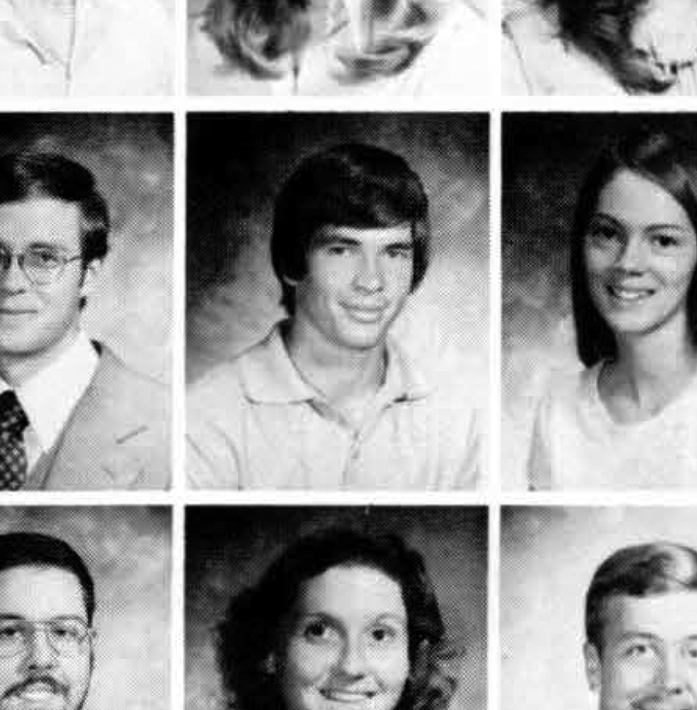
Four and a half years later, Tom was a mechanical engineer. He was fluent in the language of the principles he’d grown up grasping instinctively, now with a knack for the higher level stuff. His professors took notice.
When Glenn Maples learned that the only student to get an A on his thermodynamics of power systems final planned to immediately enter the workforce, he told him to think again.
“Dr. Maples told me I was going to grad school,” Tom said. “He said ‘we’re going to hire you to work on a Department of Energy contract. You can take one course a quarter, get your student debt paid off and finish up your master’s.’”
Tom pinched himself.
“Coming from my background… well, it took me a while to realize I was good enough to compete,” he said.
Auburn, he said, gave him that confidence — and opportunities to use it. Maples, as it turned out, owned an energy conservation consulting business with mechanical engineering professor David Dyer. They began farming out some of the work to Tom. It paid well.
He started making enough to start thinking long term about an Auburn graphic design student he’d met named Patti. Regionally, nationally, even internationally, Tom started making a name for himself. Want an energy audit your company could really use?
There was an Auburn man who’d do you right.
Things went according to plan. He earned money. He earned his master’s. Then it happened all over again.
Maples told his brother, an engineering professor at LSU, that they ought to give one of their Alumni Federation Fellowships to the Burch boy he had working for him.
Before he knew it, Tom, former aspiring HVAC technician, was Dr. Tom Burch.
Then Maples and Dyer made him an offer — bring that doctorate back to town, we’ll make you a partner. That sounded fine. Business was booming. He and Patti, knot tied, were planning to start a family. Tom had said yes to Auburn for 15 years.
No reason to stop now.
No reason to stop ever.
THE PRACTICAL-MINDED PROFESSOR
Teaching was never really mechanical engineering senior lecturer Tom Burch’s intention. It just happened. It was 1990 or so. Tom picked up the phone. It was John Goodling, head of the Department of Mechanical Engineering.
“He’d heard I was back,” Tom said. “He said ‘we need some help teaching a thermo class.’”
Tom hesitated; he traveled a lot. Goodling kept pressing — they’d work around his schedule. Just try it.
One quarter turned into two. One course turned into two. Somehow along the way — he’s still not sure how — he became an Auburn Engineering faculty member.
That was 31 years ago. He’s loved every second of it. Or at least every second of the good stuff.
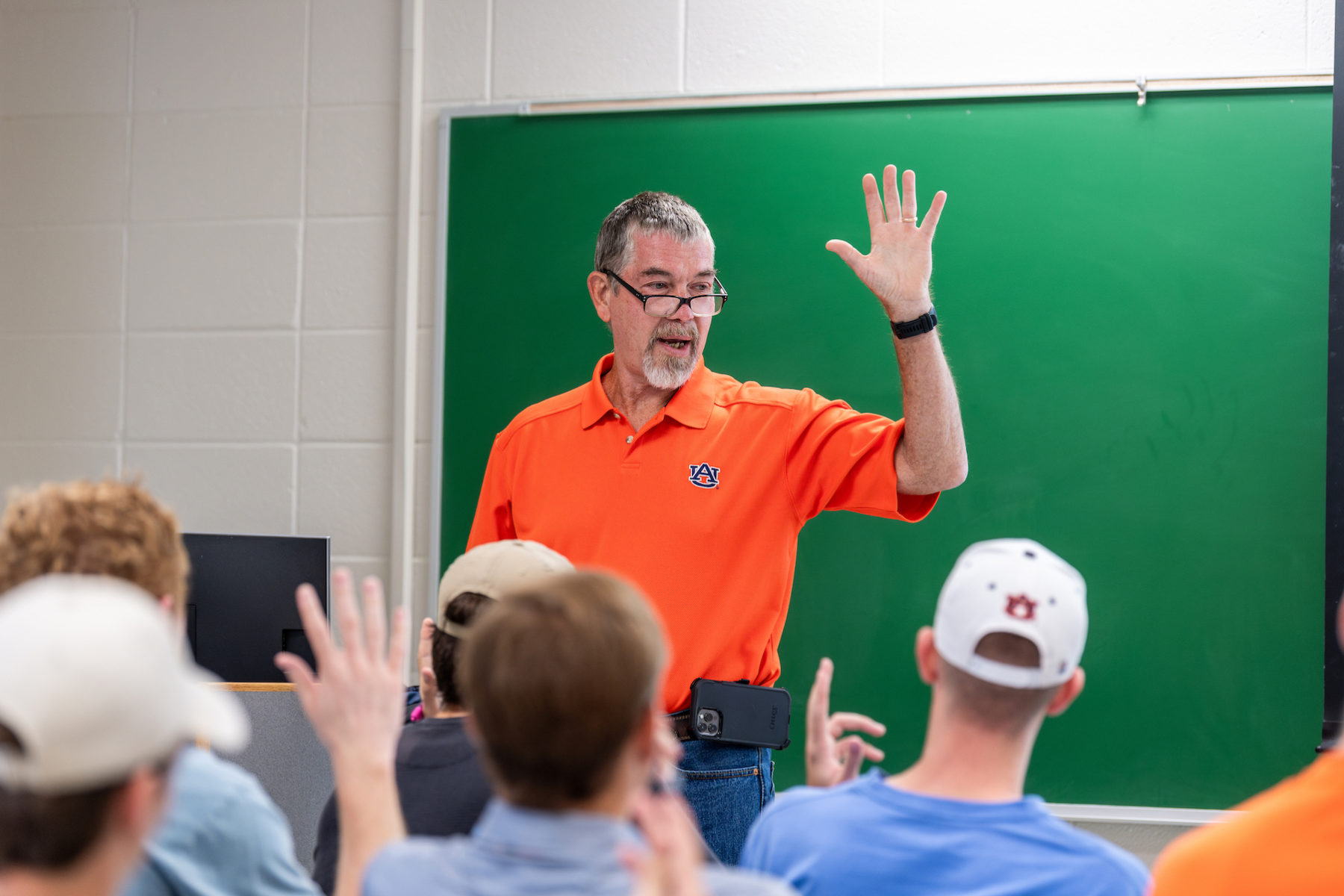
The teaching — for Tom, that’s where it’s at. No neckties. Greasy hands. The real world. The practical world.
“A lot of times, in other places, anything practical is frowned upon,” Tom said. “Writing papers, doing fundamental research — that’s not enjoyable to me. But I very much enjoyed the teaching. I think, for some students, I’m pretty good at it. I’m pretty good for them.”
The decades, he said, have taken a toll on the next generation in the fundamentals department. And that, more than ever, is where Tom feels like he’s made a difference. Want to learn about quantum mechanics? Fine. First, take his fluids class and learn exactly how a hot water heater works.
Or go with him to Bolivia.
That’s actually what’s meant the most over the years, he says — his advising role with Auburn’s chapter of Engineers Without Borders (EWB). There’s nothing more demonstrative of the Auburn Creed — and Tom’s loved the Creed “since before I even knew what it was” — than EWB. You can’t condense clean water out of thin air with a couple of random wires stuck to a Tuscaloosa spigot. But you can get it down a Bolivian mountain — if you know the fundamentals, and how to apply them. The looks on the faces of the families they help? That’s better than a 4.0.
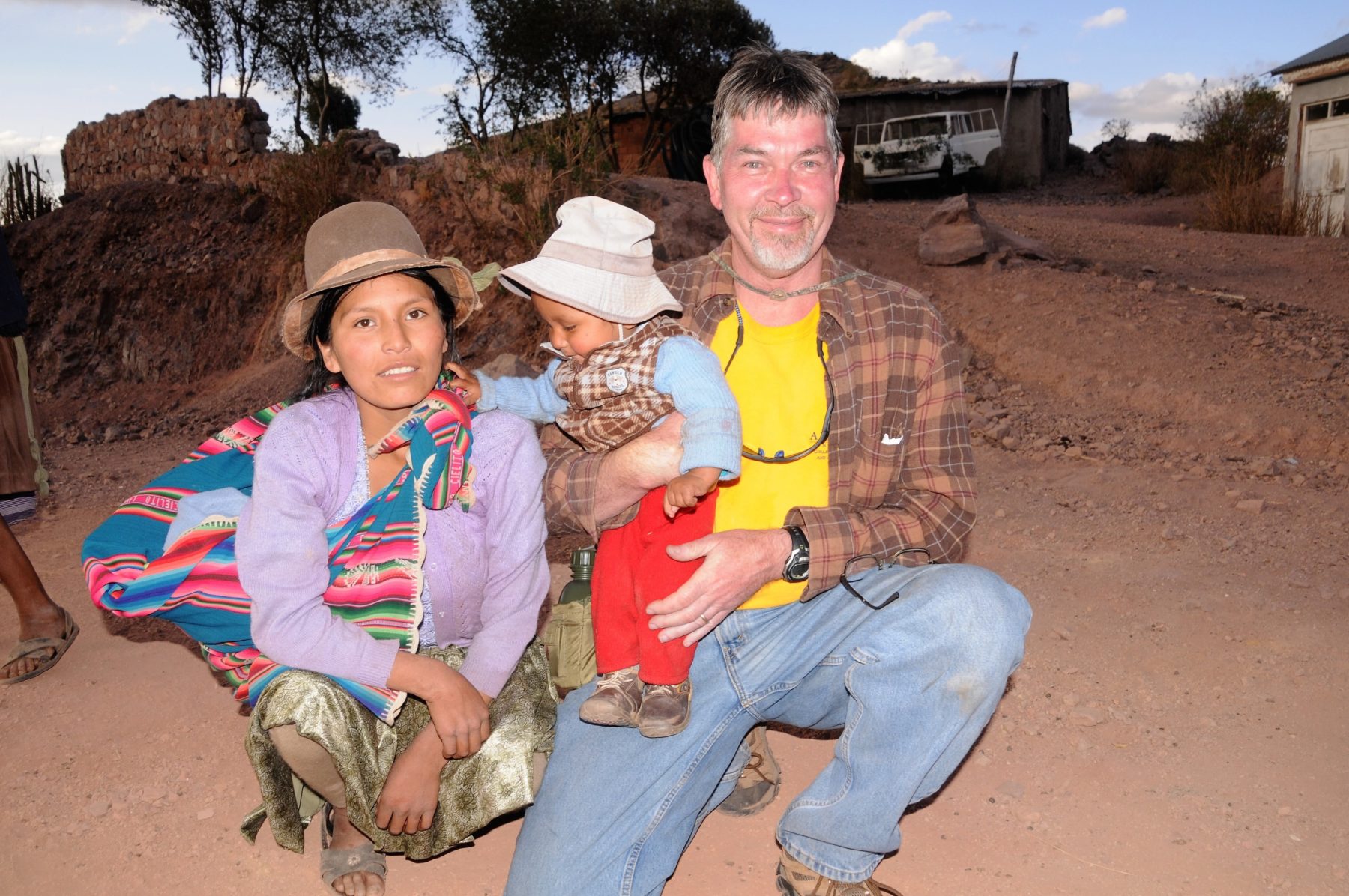
“You gain a lot of insight into physical principles by physically working with things,” Tom said. “I had a group of EWB students at my house the other day testing for an irrigation system we wanted to build in Bolivia, and there was a girl who said ‘this is the first time I’ve ever held a tool in my life.’”
Thanks to Tom, it won’t be the last.
That’s what he likes to imagine as his legacy — students with the knowledge and skills to get the job done. Students like Hunter Burch.
PRUDENTIA SIMPLICITATE
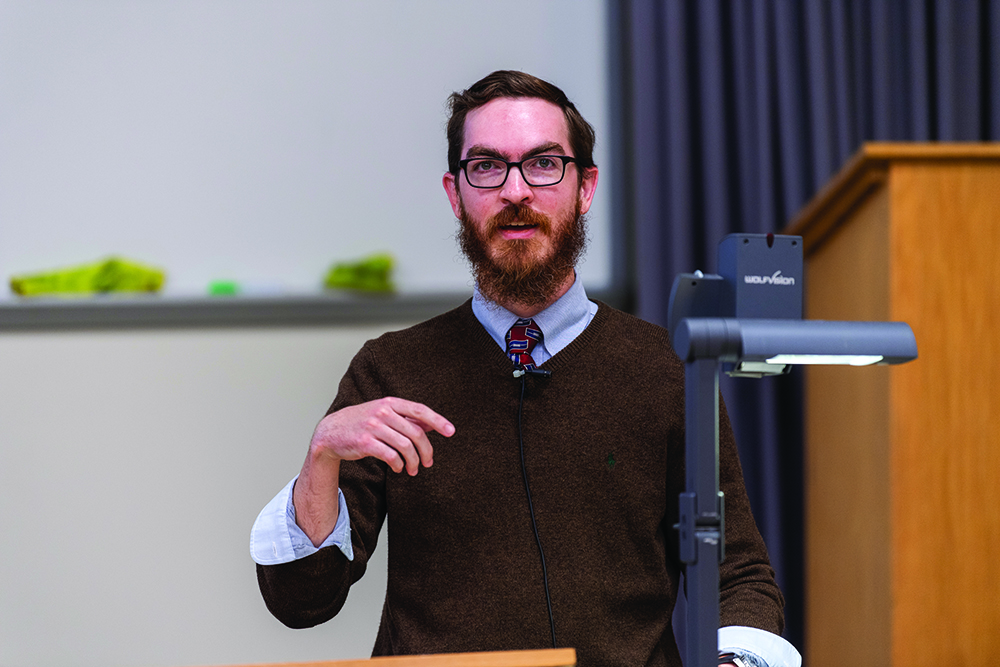
Electrical engineering assistant professor Hunter Burch, a 2014 electrical and computer engineering graduate who got an A in Tom Burch’s thermodynamics class, has a funny theory about how things all worked out. But he’s not entirely joking.
One of his many hobbies? Genealogy. He’s traced the Burch name back to the Saxons, found the family heraldry.
The family motto? “Prudentia Simplicitate.”
“Basically, it translates to ‘simply prudent,’” Hunter said.
Prudent: Wise in practical affairs. The first line of the Auburn Creed, basically.
Not that all Burch family affairs were perfectly practical.
It’s hard for Hunter to keep track of how many crazy projects he and his younger brothers Harrison, ’17 electrical and computer engineering, and Hayden, ’22 mechanical engineering, did with dad growing up. After fixing things around the house and changing brake pads, they’d get to the fun stuff that expanded Hunter’s appreciation for the possible. They never sucked water from the air with wires. But a leaf blower-powered hoverboard, a chainsaw-powered bike? Sure. They turned a disposable camera into a taser, built a steam engine.
“Oh,” Hunter said, “and we made a snow machine.”
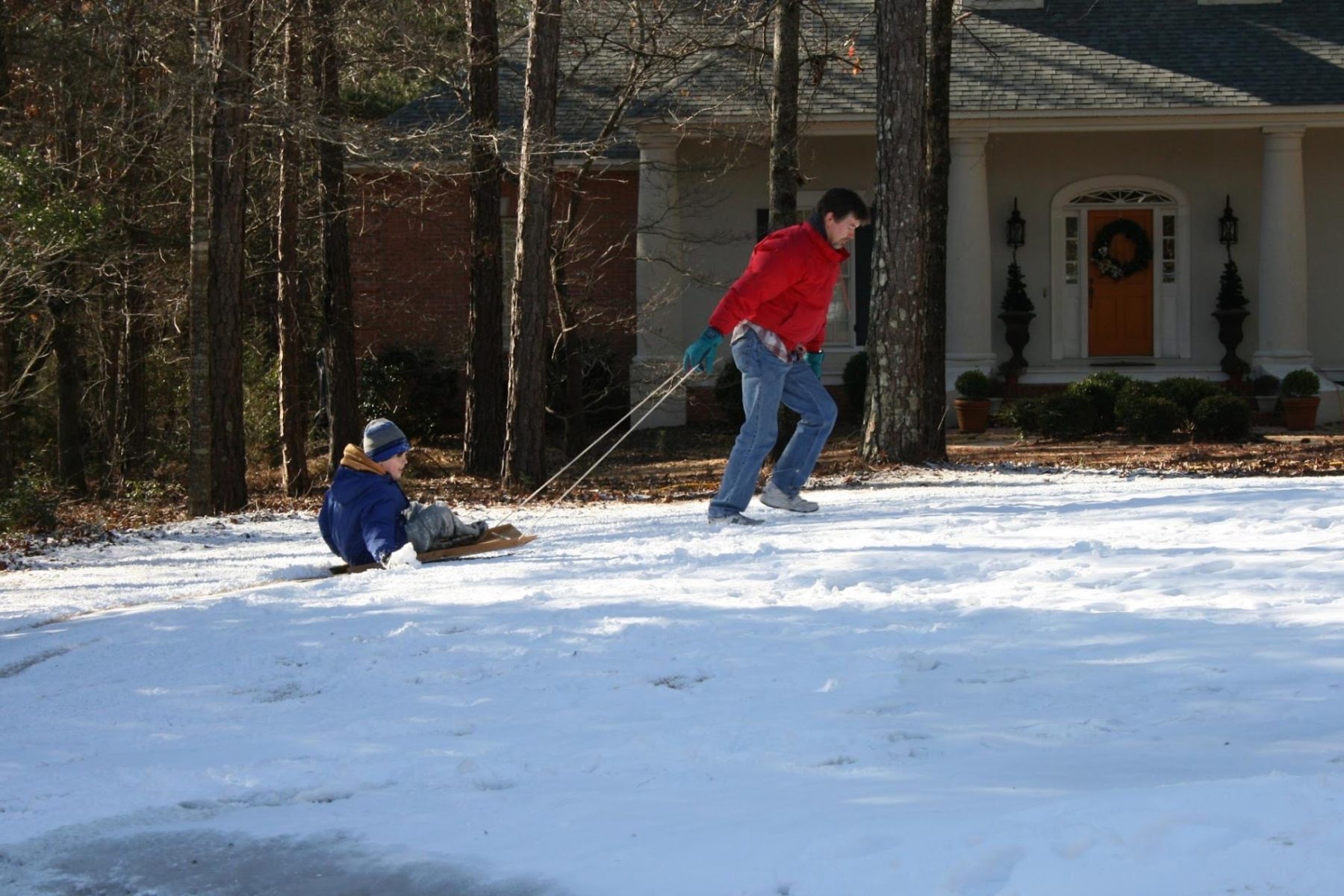
In March 2020, he heard that his dad, his brother Hayden and one of his dad’s former students, mechanical engineering assistant professor Michael Zabala, spent the first weeks of COVID-19 in the garage converting a CPAP machine into a working ventilator as a pandemic mitigation effort. To Hunter, it sounded like just another Saturday on Springwood Drive.
“We’d have an idea,” Hunter said, “and dad would say, ‘OK, how do we do it?’”
Hunter takes the same practical approach in class. But don’t suggest electromagnetics isn’t practical. He doesn’t like that.
“I want my students to look at the world how dad taught me and apply it to something that’s much less tangible,” Hunter said. “To take that very mechanical engineering mindset of this is a practical, physical world, but apply it to a more theoretical field. Maybe you can’t grab it and shake it and make it tell you what it’s doing, but can you build an antenna and say ‘if the field is doing what I think it’s doing, then here’s what I’ll get out of this antenna’?”
The approach seems to be working. Back in April, Hunter was named Outstanding Faculty Member in Electrical and Computer Engineering (ECE), in his first semester as a tenure-track professor. It was a big day. Even bigger when Auburn University President Chris Roberts walked up to shake his hand at the awards reception.
The day before, Roberts, former dean of engineering, had been installed as the university’s new president at the Gogue Performing Arts Center. You could hear a pin drop as Roberts articulated his vision for the university, talking about family, hard work, the human touch — Creed stuff.
With anyone else, it might have sounded cliche. Not with Roberts. The Creed is what convinced Roberts to accept the chemical engineering faculty position in the first place 20 years earlier.
Plenty of places talked about excellence, he said; none set the pursuit of it in stone. The Creed, Roberts said, was “the real differentiator” for Auburn. It was what earned Auburn the right to dream big.
Hunter couldn’t give a bigger “amen.”
When he heard about the opportunity in Gakona, Alaska, for example, he didn’t hesitate. Most folks taking advantage of the resources at the High-frequency Active Auroral Research Program are engineers at the huge national labs, or professors and graduate students from some of the blueblood engineering schools. Hunter signed up an undergraduate student who was interested in heating up the ionosphere’s plasma with huge radio waves, made the trip, slapped Auburn’s name on the reservation board in the middle of the big boys, and even carved “War Eagle” into the radio spectrum — spectrum painting they call it — as an exclamation point.
“Auburn shouldn’t have a mindset of, ‘oh well, we’re just Auburn.’ We should be — and will be — competing on the world stage,” Hunter said. “The academic world should be aware of that.”
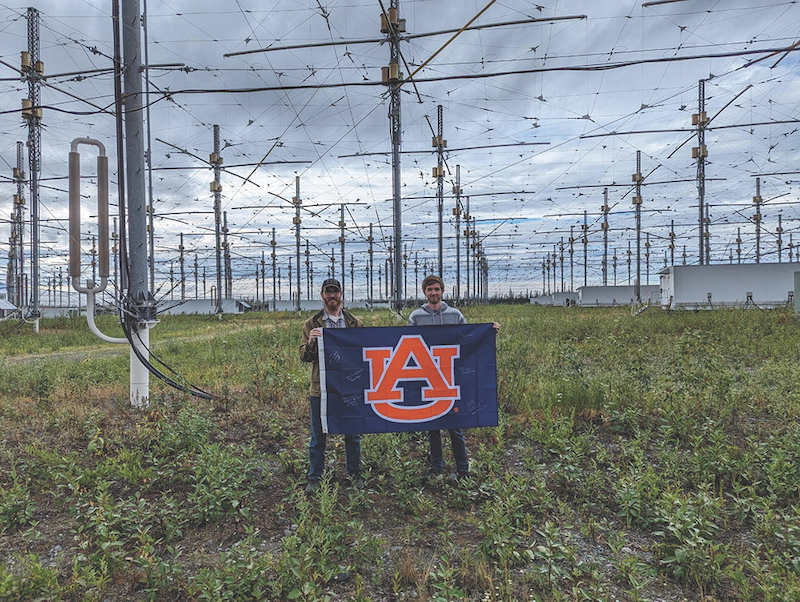
Samford Hall couldn’t have put it in any better.
“At the reception, I told Dr. Roberts that I was proud of him,” Hunter said. “Then he told me he was pretty sure me and dad were the first father-son teaching team in the college’s history.”
As if returning to Auburn hadn’t felt charmed enough for Hunter.
He’d gone to the University of Florida for his master’s degree and doctorate, traveled the world, Antarctica included (twice) — the poles are pretty good for electromagnetic experiments — and planned to make his mark in the field in… San Francisco maybe? Maybe Huntsville? Anywhere but the hometown.
But as dissertation day approached, so did — somehow — the feeling.
His dad told him it might happen — that it had certainly happened to him. Eighteen years in Moulton. Eight in Baton Rouge. The rest at Home. Hunter knew the story. And suddenly he felt like he was living the sequel.
Maybe it was the new dad in him, the first-hand knowledge that he and his Auburn High School sweetheart turned wife, Margaret, couldn’t ask for a better place to raise their son, John Thomas.
Whatever the reason, when he saw an ECE opening at his alma mater, he reached out. Just to see. Just to say he had. Department Chair Mark Nelms said he was happy to hear from him, but the position was for someone specializing in controls. Oh well. If by chance something in electromagnetics opened up, he’d let him know.
Half an hour later, Hunter’s phone buzzed.
“Lloyd Riggs just walked into my office and told me he was retiring,” Nelms said. “Let’s talk.”
NO PLACE LIKE HOME

“Dr. Burch the Elder and Dr. Burch the Younger.” That’s what Hunter dubbed them his first history-making day on the job in April 2022 partly as a joke, partly to help the students they now share.
“Coming back really almost felt like destiny, like I was claiming an inheritance, that this was set apart for me,” Hunter said. “Almost as if dad held it for me until I could grow up and come claim it. It’s not as if he got me the job — it’s like he did all the things that led me to be able to claim that role. Everything I want out of life, it’s here at Auburn.”
Tom feels the same.
“The important things that have happened in my life — I didn’t make them happen. But I was in the right place for them to happen,” Tom said “So, if you want to call this an Auburn story… well, it is an Auburn story.”
Could it have been told somewhere else, though? Could it have been told at another school?
Hunter is close to saying no; that’s how strongly he believes Auburn is special in ways other places aren’t, in a way you have to experience to understand.
Tom is more diplomatic. He supposes there are other schools that can get in your blood so thoroughly you commit your life to the place and pass the same devotion on to your sons, a place that just won’t let you or your family go. Technically, he supposes it’s possible.
But what Tom will say is this — as far as the Burches go, he knows one place it absolutely couldn’t have been.
He looks off and shakes his head.
“Yeah, that faucet thing just ticked me off.”